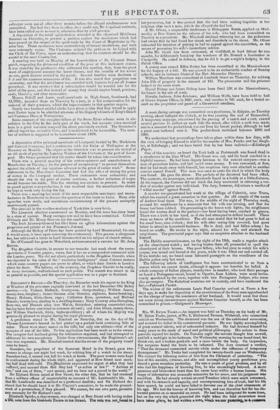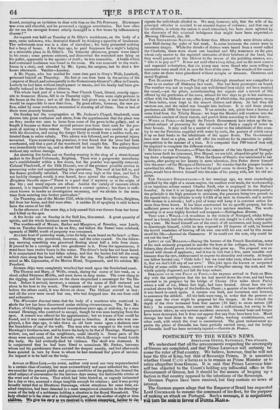Mn. W. EYTON Tootce.—An inquest was held on Thursday on
the body of Mr. W. Eyton Tooke, junior, of Ne. 2, Richmond Terrace, Whitehall, who committed suicide on Wednesday. The deceased was the son of the celebrated economist, and assisted his father in his commercial pursuits. He was highly accomplished, of great natural talents, and of unbounded industry. He had devoted himself for many years to the study of moral and political philosophy. His ardour in these pursuits injured his health. On Tuesday night the servant thought him unwell, and left a rushlight its his bedroom. On Wednesday morning he was found dead, his throat cut, and a broken penknife and a razor beside the body. On inspection, the surgeons found the brain to be inflamed. The Jury returned a verdict, "That the deceased committed suicide while under the influence of temporary derangement." Mr. Tooke had completed his twenty-fourth year on Wednesday. We extract the following notice of him from the Chronicle of yesterdays "The loss of this amiable, virtuous, and able and accomplished young gentleman pro- duced a great sensation yesterday. He was a youth of great promise, and by ail who had the happiness of knowing him, lie was exceedingly beloved. A more generous and benevolent heart than his never beat within a human bosom. His range of information was unusually extensive foe his years, and his judgment Wen excellent. He had already written several Treatises which were much esteemed, and with his research and sagacity, and uncompromising love of truth, had his life been spared, he could not have failed to become one of the chief ornaments of his age. We had the honour of knowing him, and can therefore feel for his dis- tressed parents on So mournful an event. He had been indisposed kir sometime, but on the very day which preceded the night when the fatal occurrence thust have taken placer he bed written a hot% whisk we saw psterdgh464600/Att friend, accepting an invitation to dine with him on the 7th February. His temper was even and cheerful, and he possessed a vigareus constitution. But how often do we see the strongest frames utterly derangid' in a few hours by inflammatory disease I "
An inquest was held on Tuesday at St. Giles's workhouse, on the body of a man, name unknown, who destroyed himself by drinking a quantity of laudanum. T.he unfortunate man was in a state of starvation ; his body presented nothing but a heap of bones. A few days ago, he paid fourpence for a night's lodging at a miserable place in St. Giles's. On Saturday afternoon, groans were heard in his room ; some persons entered, and discovered the wretched man lying on his pallet, apparently in the agonies of death ; he was insensible. A bottle which had contained laudanum was found in the room. He was removed to the work- house in a chair, and attended by Mr. Lyons, the surgeon, but he died a few hours afterwards. Verdict—Lunacy.
A Mr. Pepys, who has resided for some time past in Gray's Walk, Lambeth, poisoned himself on Thursday. He had at one time been in the service of the gamperor of Brazil,and subsequently in the Commissary-General's office in Canada. Latterly he had been without employment or means, and his family had been gra- dually reduced to the deepest distress. The whole back part of a house in New Church Court, Strand, exactly oppo- site to Somerset House, fell in on Thursday night. There were eight persons in the house at the time ; and as all the floors had given way, it was feared that it would be impossible to save their lives. By great efforts, however, the new po- lice, aided by some workmen, succeeded in rescuing all of them. One or two of them were severely bruised.
On Sunday last the congregation at Mr. Jackson's Chapel, Stockwell, were thrown into great confusion and alarm, from the apprehension that the place was on fire; smoke was seen to issue from some of the pews in the gallery, and at length it became so dense that several persons rose from their seats for the pur- pose of making a hasty retreat. The reverend gentleman was unable to go on -with his discourse, and seeing the danger likely to result from a rudden rush, en- treated them to retire calmly. This advice was followed, and no personal injury occurred. Upon examining the premises, it was found that the stove had been overheated, and that a part of the woodwork had caught fire. The gallery floor was immediately taken up, and in about half an hour the fire was extinguished without any serious damage.
An alarming fire broke out on Sunday evening in the shop of a straw-bonnet maker in the Royal Colonnade, Brighton. There was a gunpowder manufactu- rer's establishment within a few doors, but the powder was speedily removed. Colonel Thackwell, of the 15th Hussars, was of the greatest possible service in preserving order and superintending the operations. The roof at last fell in, and the flames gradually subsided. The wind was very high at the time, and had it not luckily changed, would, it was feared, have spread the conflagration. The Brighton Gazette says—" There is a good deal af mystery as to the origin of the fire ; and many reports are afloat. Amidst the variety of rumours which abound, it is impossible at present to form a correct opinion ; but there is suffi- cient known to render an investigation necessary, and we abstain in the mean time from entering into further particulars."
On Thursday, one of the Misses Cliff, while riding near Kemp Town, Brighton, fell from her horse, and died soon after. A sudden fit of apoplexy is said to have been the cause of her fall.
In the afternoon of the same day, a lady named Sich was thrown from her horse and killed on the spot.
A fire broke out on Sunday in the Bull Inn, Gravesend. A great quantity of spirits, and the whole furniture were burned.
The woollen-mill of Messrs. Barker and Musgrave, of Bramley, near Leeds, was on Tuesday discovered to be on fire; and before the flames were subdued, upwards of 30004 worth of property was consumed. At elate hour of yesterday week, cries for help were heard on the beach at Star. cross. Nothing was perceived, however, and the cries ceased. On the follow- ing morning something was perceived floating about half a mile from shore. It proved to be a carriage with two gentlemen in it. From the appearances, it must have been twelve hours in the water. The driver's body has not been found. It is conjectured that he had fallen asleep, and that the horses had left the road, which runs along the beach, and made for the sea. The sufferers were recog- nized as Mr. Lipscombe, of the Marine Hotel, Teignmouth, and his relation Mr. Pousford.
Sixteen ships were completely wrecked last week upon the Sunderland coast.
The Thomas and Mary, of Wells, struck, during the storm of last week, on a shoal called Skeyness Middle, and went down in,deep water. The crew clung to the rigging, and the spectators on the shore despatched a messenger for -the life- boat. Before it arrived, however, a seaman of the name of Bell ventured out alone in his boat to the meek. The captain contrived to get into the boat, but before the others could, it was driven on shore. The lifeboat arrived at last: and all the crew were saved but one, who had dropped into the sea from cold and exhaustion.
The Worcester Journal states that the body of a murderer who contrived to elude the law has been discovered under striking circumstances. The Rev. Mr. Parker, of Oddingley was murdered twenty-three years ago, at mid-day, by a man named Hemings, who contrived to escape, though he was seen hurrying froth the spot. A reward was offered for his apprehension ; but no traces of him could be found, and it was rumoured that he had gone to America. A man who was em- ployed, a few days ago, to take down an old barn came upon a skeleton near the foundation of one of the walls. The man who was engaged in the work was Hemings's brother-in-law, and he knew the body to be that of Hemings. Hemings's widow, too, and some of the neighbours, could identify it. Some parts of the dress were undecayed, and the foot-rule which, Hemings used was fouud beside the body. He had evidently died by violence. The skull was shattered. It is conjectured that he had been hired to assassinate Mr. Parker, between whom and his parishioners there existed the deepest enmity, and had afterwards been quieted in turn by those to whom he had rendered the piece of service. An inquest is to be held on the body.



















 Previous page
Previous page